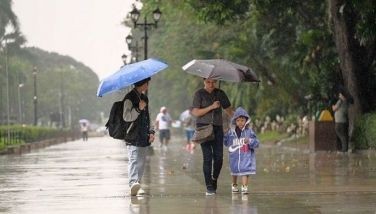Corruption in countries vulnerable to climate change must be cut - report
MANILA, Philippines - Corruption in countries most vulnerable to climate change, including the Philippines, must be cut, according to global watchdog against corruption Transparency International.
In a report entitled “Global Corruption: Climate Change” released yesterday, the watchdog group said that based on contributions from more than 50 experts, it found that stronger oversight is needed in the countries most affected by climate change, which will ultimately make policies more effective.
In the ranking of nations according to corruption risk, where 0 is extremely corrupt and 10 is “very clean,” none of the 20 countries most affected by climate change, mainly in Africa and South Asia, scored higher than 3.5.
Afghanistan was seen as most at risk of corruption with a score of 1.4, while Thailand scored 3.5.
Total global climate change investments are expected to reach almost $700 billion by 2020.
“Where huge amounts of money flow through new and untested financial markets and mechanisms, there is always a risk of corruption,” the report of the Berlin-based group said.
It said that corruption risks are high because of the complexity, uncertainty and novelty around many climate issues, and added that carbon markets, the main financial tool for combating climate change, continue to be shaken by fraudulent activity.
TI said that the impacts of climate change will be felt all over the world, in developed and developing countries alike.
However, in countries where governance is poor, the response to climate change will be particularly weakened, putting lives and livelihoods at risk, it said.
Many of the countries judged most vulnerable to the most visible effects of climate change by the World Bank – drought, flooding, storms or rising sea levels – are also countries where experts perceive high levels of corruption in public services, according to TI’s Corruption Perceptions Index (CPI).
In the Philippines where storms are the most noticeable climate-related event, government effectiveness score was pegged at 55.0 while CPI score was at 2.4.
In terms of disaster preparedness, TI said that Southeast Asian nations like the Philippines should budget amounts equivalent to five to six percent of their gross domestic product for disaster management. At present, however, they budget only two to three percent.
Huguette Labelle, chair of Transparency International, said that good governance will help ensure the success of the impact of climate change policy and funding.
“Corruption holds nothing sacred, not even our planet’s future. Failure to properly govern climate change measures now will not only lead to misallocated resources and fraudulent projects today, but also hurts future generations,” said Labelle.
- Latest
- Trending































